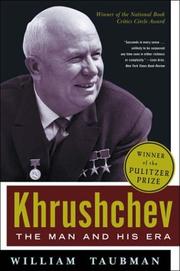| Listing 1 - 10 of 40 | << page >> |
Sort by
|
Book
ISBN: 0333172620 9780333172629 Year: 1975 Publisher: London Macmillan
Abstract | Keywords | Export | Availability | Bookmark
 Loading...
Loading...Choose an application
- Reference Manager
- EndNote
- RefWorks (Direct export to RefWorks)
Internal politics --- Russian Federation --- Soviet Union --- History --- Soviet UnionHistory --- Russia --- Soviet Union - History - 1953-1985
Book
ISBN: 0393019810 Year: 1985 Publisher: New York (N.Y.) : Norton,
Abstract | Keywords | Export | Availability | Bookmark
 Loading...
Loading...Choose an application
- Reference Manager
- EndNote
- RefWorks (Direct export to RefWorks)
United States --- Soviet Union --- Foreign relations --- Politics and government --- 1953-1985
Book
ISBN: 9782930176581 293017658X Year: 2007 Publisher: Paris Jeunesse et droits
Abstract | Keywords | Export | Availability | Bookmark
 Loading...
Loading...Choose an application
- Reference Manager
- EndNote
- RefWorks (Direct export to RefWorks)
Social work with youth --- France --- Vitry-sur-Seine (Val de Marne) --- Personal narratives --- History --- 1953-1985
Book
Year: 1957 Publisher: [Washington, D.C.] : Office of Current Intelligence, Central Intelligence Agency,
Abstract | Keywords | Export | Availability | Bookmark
 Loading...
Loading...Choose an application
- Reference Manager
- EndNote
- RefWorks (Direct export to RefWorks)
1953-1985 --- Soviet Union --- Communist countries --- Communist countries. --- Soviet Union. --- Politics and government --- Foreign relations
Book
ISBN: 2878990331 9782878990331 Year: 1991 Volume: *13 Publisher: Paris Le Monde
Abstract | Keywords | Export | Availability | Bookmark
 Loading...
Loading...Choose an application
- Reference Manager
- EndNote
- RefWorks (Direct export to RefWorks)
Soviet Union --- History --- 947.098 --- -Soviet Union --- -History --- -947.098 --- Soviet Union - History - 1953-1985 --- Soviet Union - History - 1985-1991
Book
ISBN: 0269671765 9780269671760 Year: 1970 Publisher: London : Pall Mall press,
Abstract | Keywords | Export | Availability | Bookmark
 Loading...
Loading...Choose an application
- Reference Manager
- EndNote
- RefWorks (Direct export to RefWorks)
Book
ISBN: 2130473326 9782130473329 Year: 1995 Volume: 3038 Publisher: Paris : PUF - Presses Universitaires de France,
Abstract | Keywords | Export | Availability | Bookmark
 Loading...
Loading...Choose an application
- Reference Manager
- EndNote
- RefWorks (Direct export to RefWorks)
History --- Geography --- URSS --- USSR --- Soviet Union --- Politics and government --- Histoire --- Politique et gouvernement --- Soviet Union - History - 1953-1985.
Book
Year: 1977 Publisher: Paris : Editions du Seuil,
Abstract | Keywords | Export | Availability | Bookmark
 Loading...
Loading...Choose an application
- Reference Manager
- EndNote
- RefWorks (Direct export to RefWorks)
Plûŝ, leonid ivanovič (1939-....) --- Écrits d'immigrés russes --- Dissidents --- Prisonniers politiques --- Hôpitaux psychiatriques --- Urss --- Biographies --- Politique et gouvernement --- 1953-1985

ISBN: 0393324842 Year: 2004 Publisher: London ; New York, NY : W. W. Norton,
Abstract | Keywords | Export | Availability | Bookmark
 Loading...
Loading...Choose an application
- Reference Manager
- EndNote
- RefWorks (Direct export to RefWorks)
Book
ISBN: 0691094594 1306986214 0691602301 1400861136 9781400861132 0691631832 Year: 2014 Publisher: Princeton, NJ
Abstract | Keywords | Export | Availability | Bookmark
 Loading...
Loading...Choose an application
- Reference Manager
- EndNote
- RefWorks (Direct export to RefWorks)
In this unprecedented work on the status and role of intellectuals in Soviet political life, a former Soviet sociologist maps out the delicate, often paradoxical, ties between the political regime and the creative thinkers who play a major part in the movement toward modernization. Beginning with Stalin, Vladimir Shlapentokh explores the mutual need and antagonism that have existed between political leaders and intellectuals. What emerges is a fascinating portrayal of the Soviet intellectual network since the 1950s, which touches on such topics as the role of literature and film in political opposition, levels of opposition (open, legal, and private), and the spread of paranoia as fueled by the KGB. Throughout he shows how the intellectual communityusually a cohesive, liberal grouphas fared under Khrushchev's cautious tolerance, Brezhnev's repressions, and now Gorbachev's Glasnost.Shlapentokh maintains, however, that under Glasnost freer speech has revealed a more pronounced divergence between liberal and conservative thinkers, and has allowed for open conservative opposition to the reformatory measures of Gorbachev and the liberals. He argues that one of the strongest checks on reform is the growing presence of Russophilism--a movement supporting Russian nationalism and Stalin's concept of socialism--among the political elite and the masses. Although the role of the liberal intellectuals in the late 1980s was less prominent than it was in the 1960s, Shlapentokh asserts that they remain the major agent of modernization in the Soviet Union, as well as in other socialist countries.Originally published in 1990.The Princeton Legacy Library uses the latest print-on-demand technology to again make available previously out-of-print books from the distinguished backlist of Princeton University Press. These editions preserve the original texts of these important books while presenting them in durable paperback and hardcover editions. The goal of the Princeton Legacy Library is to vastly increase access to the rich scholarly heritage found in the thousands of books published by Princeton University Press since its founding in 1905.
Soviet Union -- Intellectual life. --- Soviet Union -- Politics and government -- 1953-1985. --- Soviet Union -- Politics and government -- 1985-1991. --- Soviet Union --- Intellectual life. --- Politics and government --- Intellectual life --- From 1917 --- 1953-1985 --- 1986 --- -Soviet Union - Intellectual life - 1917 --- -Soviet nion - Politics and government - 1953-1985. --- Soviet Union - Politics and government - 1986 --- -Soviet Union --- HISTORY / Russia & the Former Soviet Union. --- -HISTORY / Russia & the Former Soviet Union. --- Soviet Union - Intellectual life - 1917
| Listing 1 - 10 of 40 | << page >> |
Sort by
|

 Search
Search Feedback
Feedback About UniCat
About UniCat  Help
Help News
News